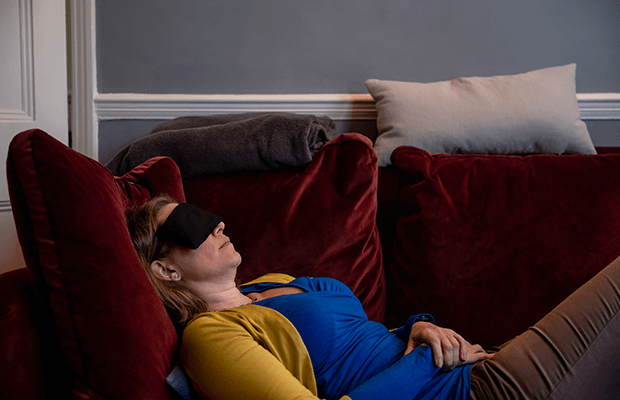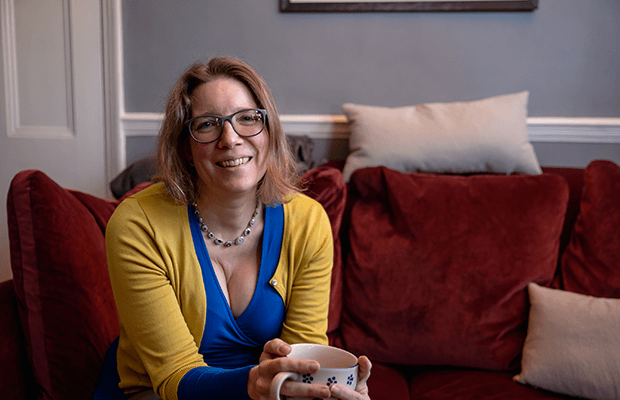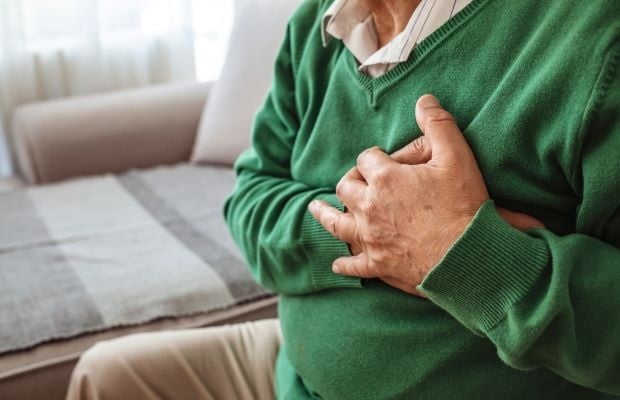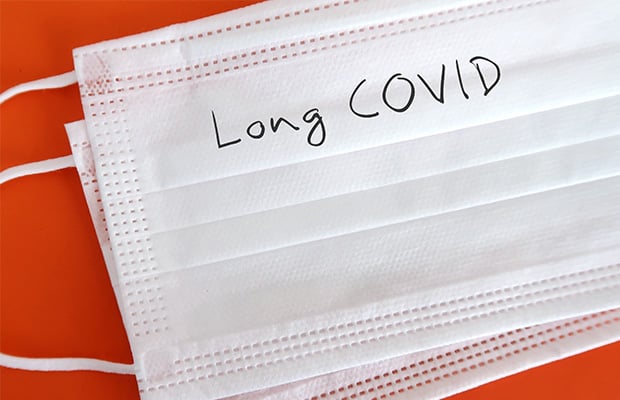Before she got Covid in October 2021, Professor Kerstin Sailer, 46, from London had a busy life as an academic and a mum of two daughters. She says: “The year before I got Covid I had been made a professor. My job was very busy, but I loved it.”
Lasting fatigue, chest pain and palpitations

Kerstin, who was vaccinated when she got Covid, says: “I had a headache, muscle aches, fever, shivers. I thought I’ll just be in bed for a week or two and then it will be OK.” But after a couple of weeks, when she started to work again, she didn’t feel better, and fatigue set in. Around November she developed chest pains, and her heart was sometimes racing. “I told my husband, Christian, it felt as if I had a constant brick on my chest, it was so heavy. If I went up a flight of stairs my heart would start racing, and it would stay like that for minutes on end. And I was tired all the time.”
- Visit our long Covid page for information about heart palpitations or changes to your heart rate after Covid.
Searching for answers
One day when she had palpitations, Kerstin called 111. “They were really supportive. They sent me an ambulance and said we need to rule out any heart-related issues. They took me to hospital, where I had an ECG and a chest X-ray, and I was told everything is fine. I had low vitamin D levels, and I had some slight anaemia, so I was discharged and told to take vitamin D and iron supplements. And I think my experience of being discharged without any clear answers is a pretty regular occurrence for lots of people with long Covid, because we don’t know exactly how to treat it.”
Boom and bust
Chest pain and fatigue are the two main symptoms she struggles with, as well as “crashing” after exertion, even just working for two hours on her laptop. “When I overdo it, my symptoms flare up.” Kerstin also finds many other symptoms come and go, including bouts of insomnia, headaches, dizziness, coughing, “brain fog”, when she can’t focus or think clearly, joint pains, numbness in her fingers and arms, and problems regulating her temperature.
We're here for you with information and support
Our fortnightly Heart Matters newsletter includes the latest updates about staying healthy when you have a heart condition, such as support for healthy eating, staying active and your emotional wellbeing.
I'd like to sign up
Impact on work and home life
Kerstin took three weeks off work over Christmas. But in January 2022, she was still unwell and realised she needed to be signed off on sick leave. “I realised this wasn’t going away. Those were difficult days, both for my physical and mental health.” Kerstin took 14 months off work before returning part time recently. “I’m pleased to return but I’m taking it slowly, as I’m not back to full health.”
I felt like a battery that never charges properly
Before she got Covid, Kerstin was “a really normal healthy and fit person.” But since developing long Covid: “I felt like a battery that never charges properly. It felt like something is fundamentally wrong, but no one can tell me what it is.”
Long Covid has also had a big impact on Kerstin’s home life. “If I unload a dishwasher or I pack away a week of groceries I am very out of breath and I have to sit down afterwards. My husband has been stepping in and stepping up. He gets our daughters ready for school each morning and he is doing 90 per cent of the housework.”
Getting treatment and help

After 12 weeks of symptoms Kerstin’s GP referred her to a long Covid clinic. She is being treated for chest pain, fatigue, and some of her other symptoms both through the specialist long Covid clinic and by her own GP.
“The long Covid clinic diagnosed me with postural orthostatic tachycardia syndrome (PoTS), which causes a drop in the blood supply to your heart and brain when you move to an upright position, making your heart race. They also diagnosed other problems with the part of my nervous system which regulates unconscious functions such as heart rate, blood pressure and body temperature. It explained the trouble I’ve been having with night sweats, temperature regulation and dizziness. They put me on a high-salt diet. The thinking behind that is that if you drink a lot of water and also increase your salt intake you will increase your blood volume, which makes it easier for your circulatory system. And it means your heart doesn’t have to pump so hard when you have a drop in blood pressure.”
“I started on beta blockers to control my heart rate, which also helped the chest pain, by reducing the workload on the heart.”
- Read more about managing heart-related symptoms on our long Covid page.
Information and support
- Visit our long Covid recovery guide for tips on managing fatigue, breathlessness, brain fog and joint pain.
- Visit the NHS for tips on eating and sleeping well, getting moving again and managing daily tasks.
- Speak to your GP about any lasting symptoms and ask about being referred to a specialist long Covid clinic.
- Find an online support group such as Long Covid Support.
Finding support
Kerstin describes long Covid as like “everything unravelling”. She adds: “It affects your identity, the view you have of yourself as a healthy individual and a mother. I had a great family life, I was a successful academic, who could think and respond. All of that changed.”
Just to be heard, to be seen, to be understood, saved my life
She says it’s an extra challenge having a health condition that so little is known about. As well as fantastic support from her husband at home and colleagues at work, the first thing that helped her was finding peer support. She found a worldwide support group called Body Politic, which has a messaging app where its 11,000 members can chat.
“Just to be heard, to be seen, to be understood, saved my life. Suddenly I’d get a new symptom and I could write and ask on that channel and find people who had been through the same thing.” Kerstin also keeps a log of her daily symptoms and activities to try to find triggers and understand a little better what she can and can’t do.
It lifts my mood, helps with breathing, and reminds me that things can get better
She has also taken part in the ENO Breathe programme by the English National Opera, designed for long Covid patients. “We use vocal cord and breathing exercises like opera singers do. It helps singers warm up their voices and increase their lung capacity. It helps long Covid patients, too. We learnt to sing a different lullaby each week and I still sing some of them, pretty much daily.
“It lifts my mood, helps with breathing, and reminds me that things can get better.”
Have you got long Covid?
Have you found aspects of this article useful? Email your thoughts or share your tips about managing your symptoms.
What to read next...









